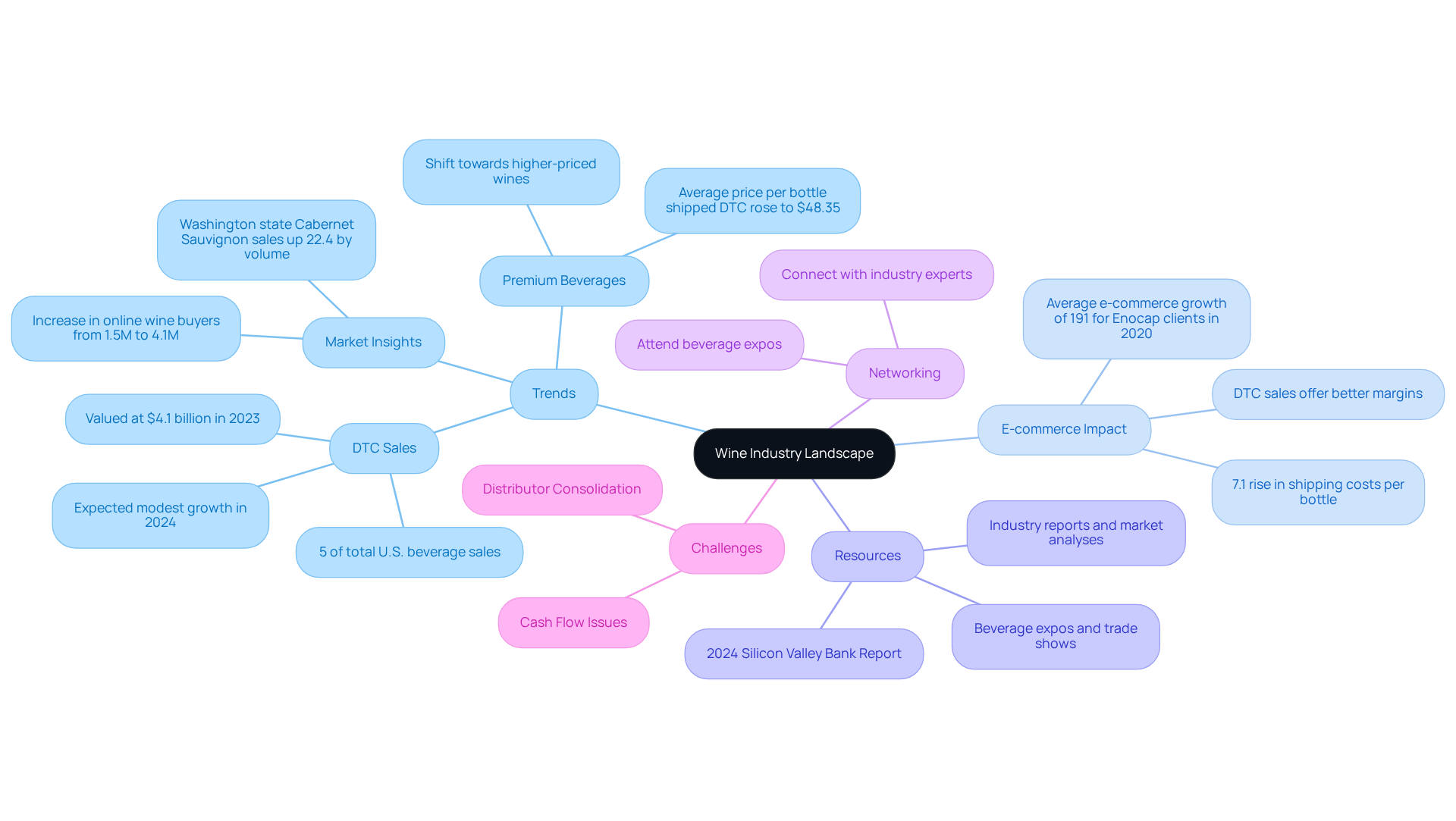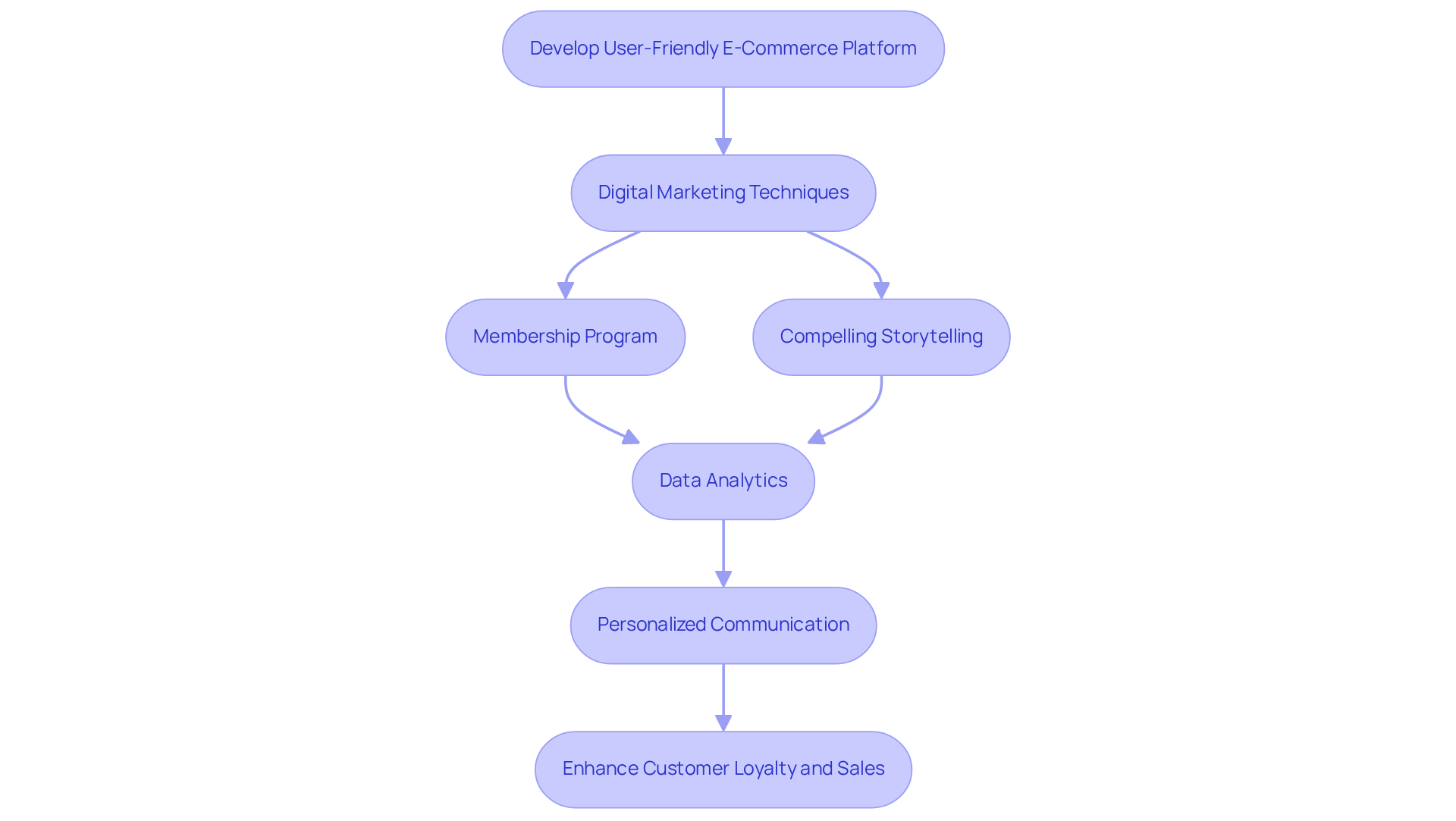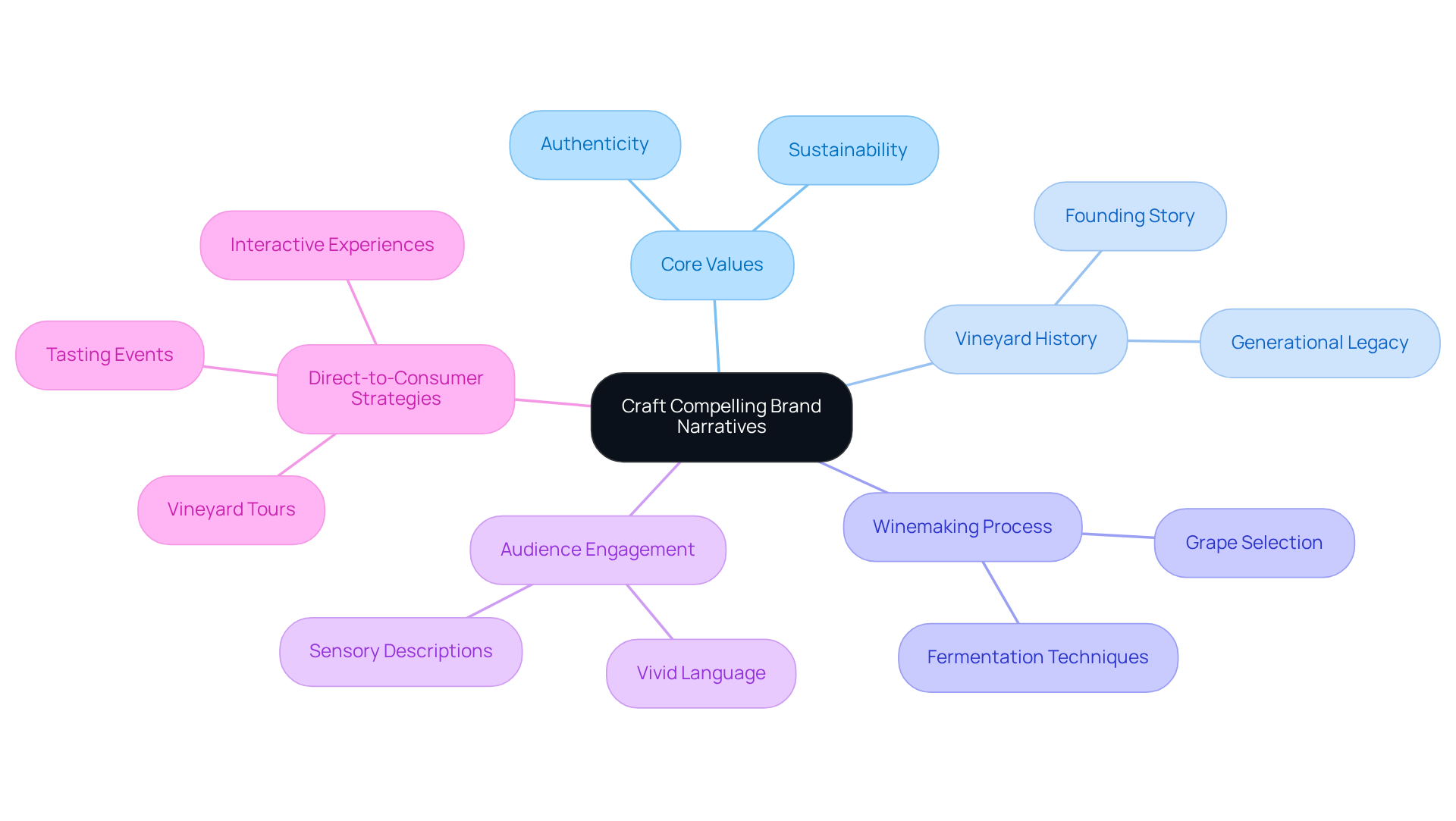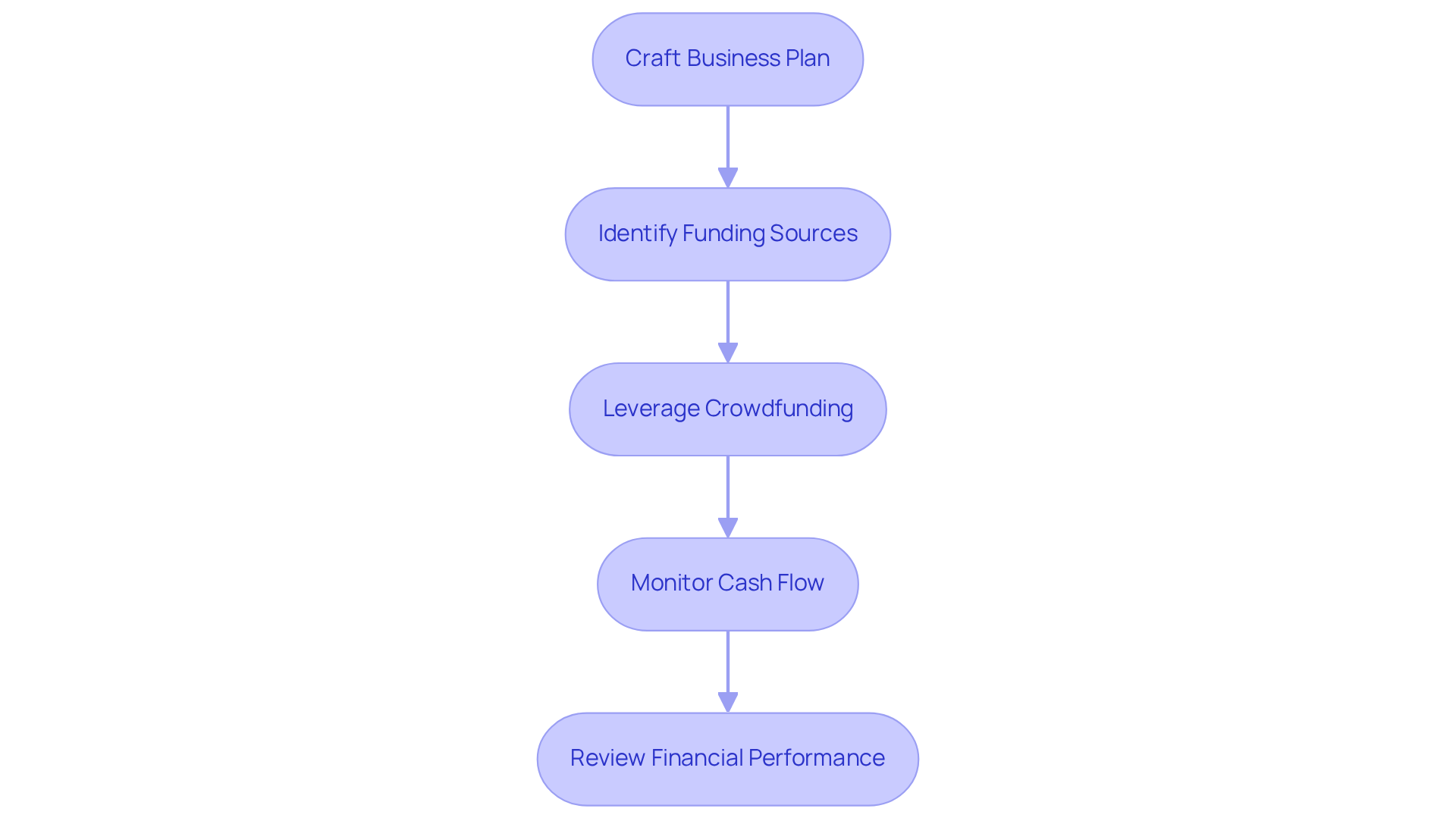Overview
To successfully launch a wine business, one must first grasp the intricate landscape of the industry. Understanding market dynamics is not merely beneficial; it is essential. Developing effective direct-to-consumer strategies is paramount, as is crafting compelling brand narratives that resonate with potential customers. Moreover, careful financial planning cannot be overlooked.
The crucial components for attracting customers and ensuring sustainable growth in a competitive market include:
- Knowledge of market trends
- A robust online presence
- Engaging storytelling
- Diligent financial strategies
By acknowledging these elements, entrepreneurs can position themselves for success and navigate the complexities of the wine industry with confidence.
Introduction
The wine industry is experiencing a significant transformation, propelled by shifting consumer preferences and innovative sales strategies. With direct-to-consumer (DTC) sales thriving, boasting an impressive valuation of $4.1 billion in 2023, aspiring entrepreneurs have a unique opportunity to establish their niche within this competitive arena. Yet, the journey to launching a successful wine business is not without its challenges, ranging from managing cash flow issues to crafting a compelling brand narrative.
How can prospective wine business owners not only navigate these hurdles but also flourish in this dynamic landscape?
Understand the Wine Industry Landscape
To embark on your journey in the beverage industry, especially if you want to learn how to start a wine business, it is essential to familiarize yourself with the current state of the sector. Key trends, such as the rise of direct-to-consumer (DTC) sales, are crucial; these sales were valued at $4.1 billion in 2023, representing approximately 5% of total U.S. beverage sales, thereby underscoring their significance in the overall market context.
Understanding the impact of e-commerce is vital, given that the rose by 7.1% last year, indicating a shift towards more premium beverages among discerning consumers. Enocap highlights the necessity of establishing sustainable DTC channels that foster consistent growth, transforming casual buyers into loyal club members through effective brand storytelling that resonates with consumers.
Leverage resources such as industry reports and market analyses, including the 2024 Silicon Valley Bank Report, which anticipates modest growth in DTC sales for 2024, to gain insights into the competitive landscape and inform your strategic planning.
Attend beverage expos and trade shows to network and gain firsthand insights into market dynamics. Additionally, remain cognizant of the challenges wineries face, including cash flow issues and the ramifications of distributor consolidation. Strategic capital planning for debt, equity, or acquisition opportunities is imperative for navigating these challenges.
This foundational knowledge will not only guide your business decisions but also assist you in understanding how to start a wine business and identify opportunities for differentiation in a crowded market.

Develop Direct-to-Consumer Sales Strategies
To create successful direct-to-consumer (DTC) sales strategies, begin with the development of a user-friendly e-commerce platform that effectively showcases your products. A well-designed site must feature intuitive navigation, secure payment processing, and efficient inventory management to significantly enhance the customer experience. Invest in robust digital marketing techniques, such as social media advertising, email campaigns, and search engine optimization, to drive traffic to your platform. Notably, 27% of new beverage club signups originate from digital channels, underscoring the critical need for a strong online presence.
Establishing a membership program for beverages can provide exclusive advantages, thereby enhancing loyalty among your most devoted clients. Compelling storytelling plays a vital role in boosting your brand's attractiveness, making it essential to effectively convey your establishment's unique narrative. Leverage data analytics to monitor customer behavior and preferences, enabling you to tailor your offerings and marketing efforts. This data-driven approach has proven successful, as evidenced by Enocap clients who experienced an in 2020, alongside an increase in online wine buyers from 1.5 million to 4.1 million. By prioritizing personalized communication and interactive engagement, you can cultivate lasting relationships that drive repeat purchases and enhance customer loyalty, ultimately ensuring your establishment thrives for generations.

Craft Compelling Brand Narratives
To craft a compelling narrative for your winery, begin by pinpointing your core values and unique attributes. Consider the rich history of your vineyard, the intricate winemaking process, and the passionate individuals behind your label. Employ vivid language and sensory-rich descriptions to weave an immersive story that resonates with your audience. Distribute your narrative across multiple platforms, including your website, social media, and packaging. Engage your customers by inviting them to partake in your story through interactive experiences, such as vineyard tours or tasting events. By adopting , you can not only elevate brand recognition but also cultivate a deeper emotional connection with consumers, ultimately transforming casual buyers into devoted club members. Authentic storytelling serves as a powerful resource that fosters consistent growth and secures the necessary funding for family-owned vineyards to thrive for generations.

Plan Financial Strategies and Secure Capital
To successfully navigate your financial strategies, begin by crafting a comprehensive business plan that delineates your startup costs, projected revenues, and operational expenses. Enocap's strategic capital advisory services are designed to assist you in pinpointing tailored funding sources—be it debt, equity, or acquisition opportunities—specifically for family-owned wineries.
Have you considered leveraging crowdfunding platforms? Engaging consumers through these platforms not only raises capital but also transforms casual buyers into loyal club members via compelling brand storytelling.
It is crucial to monitor your cash flow diligently and adjust your budget as needed to ensure financial stability. Regularly reviewing your financial performance against your objectives allows you to make that optimize profitability and foster growth.

Conclusion
Starting a wine business demands a strategic approach, where comprehending the current landscape of the wine industry is crucial. Understanding market trends, especially the surge in direct-to-consumer sales, is vital for establishing a successful venture. Entrepreneurs must harness e-commerce, craft compelling brand narratives, and develop robust financial strategies to navigate the complexities of this competitive market.
Key insights emphasize the necessity of:
- A user-friendly e-commerce platform
- Effective digital marketing
- The power of storytelling in building a brand that resonates with consumers
Furthermore, developing a comprehensive business plan and exploring diverse funding options can provide the financial stability essential for fostering growth and innovation in the wine industry.
Ultimately, embarking on the journey of starting a wine business transcends merely selling a product; it involves forging lasting connections with consumers through engaging narratives and exceptional experiences. By embracing these strategies and insights, aspiring wine entrepreneurs can position themselves for success and contribute meaningfully to the dynamic landscape of the wine industry.
Frequently Asked Questions
What should I understand about the current state of the wine industry before starting a business?
It is essential to familiarize yourself with key trends, such as the rise of direct-to-consumer (DTC) sales, which were valued at $4.1 billion in 2023, representing about 5% of total U.S. beverage sales.
How important is e-commerce in the wine industry?
E-commerce is vital, as the average cost per bottle shipped DTC rose by 7.1% last year, indicating a shift towards more premium beverages among consumers.
What role does brand storytelling play in the wine business?
Effective brand storytelling helps transform casual buyers into loyal club members, fostering consistent growth through sustainable DTC channels.
What resources can I leverage to gain insights into the wine industry?
You can utilize industry reports and market analyses, such as the 2024 Silicon Valley Bank Report, to understand competitive dynamics and inform your strategic planning.
How can I network and gain insights into the wine market?
Attending beverage expos and trade shows is an excellent way to network and gain firsthand insights into market dynamics.
What challenges do wineries face that I should be aware of?
Wineries often face challenges such as cash flow issues and the effects of distributor consolidation, which are important to consider when planning your business.
Why is strategic capital planning important in the wine industry?
Strategic capital planning for debt, equity, or acquisition opportunities is crucial for navigating the challenges faced by wineries and ensuring long-term success.
How can foundational knowledge of the industry assist in starting a wine business?
A solid understanding of the industry will guide your business decisions and help you identify opportunities for differentiation in a crowded market.




